Commander Synergies
Discover cards that synergize perfectly with your Commander.
Synergy
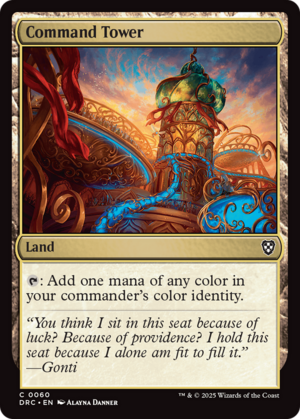
Card Details
Info
| Color: | |
| Identifies: | |
| Cost: | |
| Rarity: | Common |
| Converted Cost: | 0 |
| Power/Toughness: | / |
| Types: | |
| SubTypes: | |
| Languages: | 
          |
| Layout: | Normal |
| Rank: | |
| Saltiness: |
Rules
Text
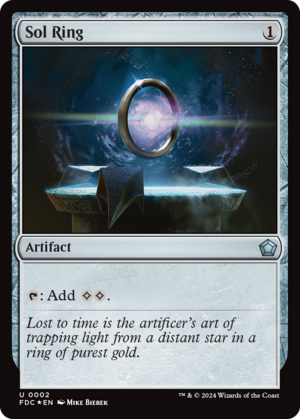
Card Details
Info
| Color: | |
| Identifies: | |
| Cost: |
|
| Rarity: | Uncommon |
| Converted Cost: | 1 |
| Power/Toughness: | / |
| Types: | |
| SubTypes: | |
| Languages: | 
         |
| Layout: | Normal |
| Rank: | |
| Saltiness: |
Rules
Text
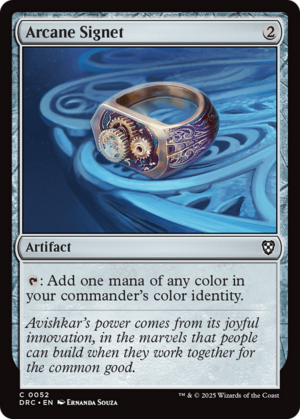
Card Details
Info
| Color: | |
| Identifies: | |
| Cost: |
|
| Rarity: | Common |
| Converted Cost: | 2 |
| Power/Toughness: | / |
| Types: | |
| SubTypes: | |
| Languages: | 
          |
| Layout: | Normal |
| Rank: | |
| Saltiness: |
Rules
Text
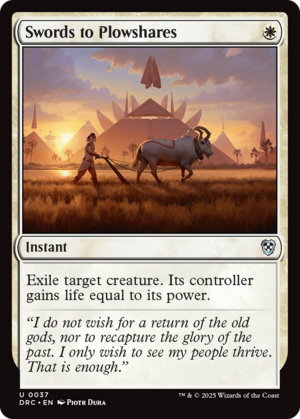
Card Details
Info
| Color: | |
| Identifies: | |
| Cost: |
|
| Rarity: | Uncommon |
| Converted Cost: | 1 |
| Power/Toughness: | / |
| Types: | |
| SubTypes: | |
| Languages: | 
         |
| Layout: | Normal |
| Rank: | |
| Saltiness: |
Rules
Prices
Legalities
Standard
Standardbrawl
Vintage
Modern
Brawl
Historic
Duel
Alchemy
Predh
Oathbreaker
Commander
Pioneer
Oldschool
Timeless
Premodern
Penny
Pauper
Gladiator
Paupercommander
Future
Legacy
Text
Exile target creature. Its controller gains life equal to its power.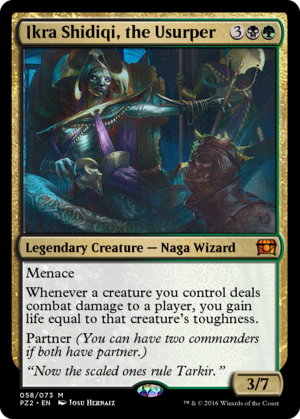
Card Details
Info
| Color: | |
| Identifies: | |
| Cost: |
|
| Rarity: | Mythic |
| Converted Cost: | 5 |
| Power/Toughness: | 3/7 |
| Types: | |
| SubTypes: | |
| Languages: | 
        |
| Layout: | Normal |
| Rank: | |
| Saltiness: |
Abilities/Keywords
Rules
Prices
| Seller | Price |
|---|
Legalities
Standard
Standardbrawl
Vintage
Modern
Brawl
Historic
Duel
Alchemy
Predh
Oathbreaker
Commander
Pioneer
Oldschool
Timeless
Premodern
Penny
Pauper
Gladiator
Paupercommander
Future
Legacy
Text
Menace Whenever a creature you control deals combat damage to a player, you gain life equal to that creature's toughness. Partner (You can have two commanders if both have partner.)Less Synergy
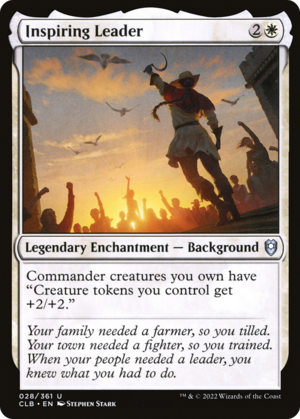
Card Details
Info
| Color: | |
| Identifies: | |
| Cost: |
|
| Rarity: | Uncommon |
| Converted Cost: | 3 |
| Power/Toughness: | / |
| Types: | |
| SubTypes: | |
| Languages: | 
          |
| Layout: | Normal |
| Rank: | |
| Saltiness: |
Rules
Prices
Legalities
Standard
Standardbrawl
Vintage
Modern
Brawl
Historic
Duel
Alchemy
Predh
Oathbreaker
Commander
Pioneer
Oldschool
Timeless
Premodern
Penny
Pauper
Gladiator
Paupercommander
Future
Legacy
Text
Commander creatures you own have "Creature tokens you control get +2/+2."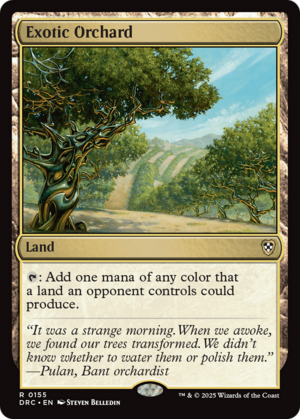
Card Details
Info
| Color: | |
| Identifies: | |
| Cost: | |
| Rarity: | Rare |
| Converted Cost: | 0 |
| Power/Toughness: | / |
| Types: | |
| SubTypes: | |
| Languages: | 
         |
| Layout: | Normal |
| Rank: | |
| Saltiness: |
Rules
Text
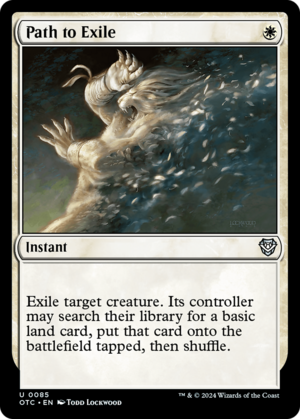
Card Details
Info
| Color: | |
| Identifies: | |
| Cost: |
|
| Rarity: | Uncommon |
| Converted Cost: | 1 |
| Power/Toughness: | / |
| Types: | |
| SubTypes: | |
| Languages: | 
         |
| Layout: | Normal |
| Rank: | |
| Saltiness: |
Rules
Text
Exile target creature. Its controller may search their library for a basic land card, put that card onto the battlefield tapped, thenshuffle
Card Details
Info
| Color: | |
| Identifies: | |
| Cost: | |
| Rarity: | Rare |
| Converted Cost: | 0 |
| Power/Toughness: | / |
| Types: | |
| SubTypes: | |
| Languages: | 
          |
| Layout: | Normal |
| Rank: | |
| Saltiness: |
Rules
Prices
Legalities
Standard
Standardbrawl
Vintage
Modern
Brawl
Historic
Duel
Alchemy
Predh
Oathbreaker
Commander
Pioneer
Oldschool
Timeless
Premodern
Penny
Pauper
Gladiator
Paupercommander
Future
Legacy
Text
(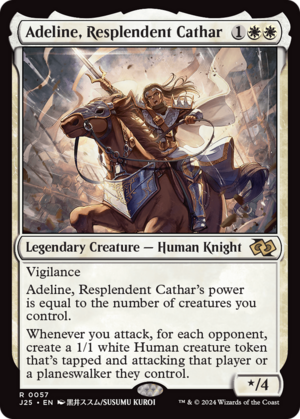
Card Details
Info
| Color: | |
| Identifies: | |
| Cost: |
|
| Rarity: | Rare |
| Converted Cost: | 3 |
| Power/Toughness: | */4 |
| Types: | |
| SubTypes: | |
| Languages: | 
          |
| Layout: | Normal |
| Rank: | |
| Saltiness: | |
| Tokens: |
Abilities/Keywords
Rules
Text
Vigilance Adeline's power is equal to the number of creatures you control. Whenever you attack, for each opponent, create a 1/1 white Human creature token that's tapped and attacking that player or a planeswalker they control.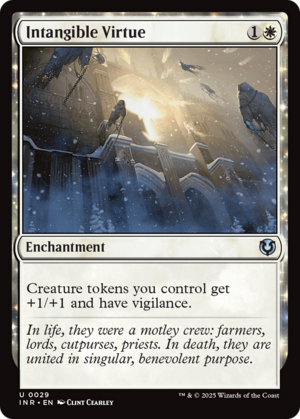
Card Details
Info
| Color: | |
| Identifies: | |
| Cost: |
|
| Rarity: | Uncommon |
| Converted Cost: | 2 |
| Power/Toughness: | / |
| Types: | |
| SubTypes: | |
| Languages: | 
          |
| Layout: | Normal |
| Rank: | |
| Saltiness: |
Rules
Prices
Legalities
Standard
Standardbrawl
Vintage
Modern
Brawl
Historic
Duel
Alchemy
Predh
Oathbreaker
Commander
Pioneer
Oldschool
Timeless
Premodern
Penny
Pauper
Gladiator
Paupercommander
Future
Legacy
Text
Creature tokens you control get +1/+1 and have vigilance.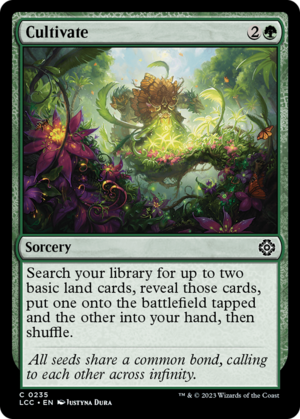
Card Details
Info
| Color: | |
| Identifies: | |
| Cost: |
|
| Rarity: | Common |
| Converted Cost: | 3 |
| Power/Toughness: | / |
| Types: | |
| SubTypes: | |
| Languages: | 
          |
| Layout: | Normal |
| Rank: | |
| Saltiness: |
Rules
Prices
Legalities
Standard
Standardbrawl
Vintage
Modern
Brawl
Historic
Duel
Alchemy
Predh
Oathbreaker
Commander
Pioneer
Oldschool
Timeless
Premodern
Penny
Pauper
Gladiator
Paupercommander
Future
Legacy
Text
Search your library for up to two basic land cards, reveal those cards, put one onto the battlefield tapped and the other into your hand, thenshuffle
Card Details
Info
| Color: | |
| Identifies: | |
| Cost: |
|
| Rarity: | Common |
| Converted Cost: | 2 |
| Power/Toughness: | / |
| Types: | |
| SubTypes: | |
| Languages: | 
          |
| Layout: | Normal |
| Rank: | |
| Saltiness: |
Rules
Text
Search your library for a Plains, Island, Swamp, or Mountain card, put it onto the battlefield tapped, thenshuffle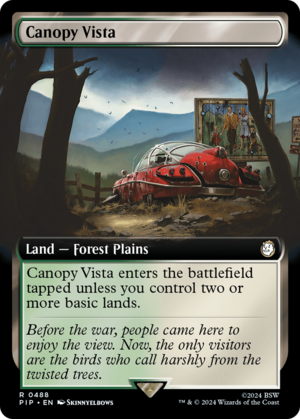
Card Details
Info
| Color: | |
| Identifies: | |
| Cost: | |
| Rarity: | Rare |
| Converted Cost: | 0 |
| Power/Toughness: | / |
| Types: | |
| SubTypes: | |
| Languages: | 
          |
| Layout: | Normal |
| Rank: | |
| Saltiness: |
Rules
Prices
Legalities
Standard
Standardbrawl
Vintage
Modern
Brawl
Historic
Duel
Alchemy
Predh
Oathbreaker
Commander
Pioneer
Oldschool
Timeless
Premodern
Penny
Pauper
Gladiator
Paupercommander
Future
Legacy
Text
(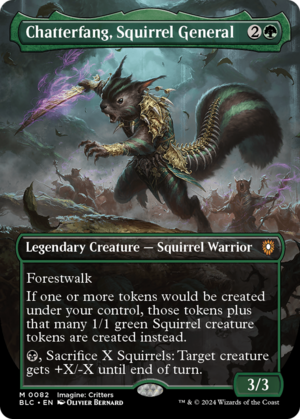
Card Details
Info
| Color: | |
| Identifies: | |
| Cost: |
|
| Rarity: | Mythic |
| Converted Cost: | 3 |
| Power/Toughness: | 3/3 |
| Types: | |
| SubTypes: | |
| Languages: | 
          |
| Layout: | Normal |
| Rank: | |
| Saltiness: | |
| Tokens: |
Abilities/Keywords
Rules
Prices
Legalities
Standard
Standardbrawl
Vintage
Modern
Brawl
Historic
Duel
Alchemy
Predh
Oathbreaker
Commander
Pioneer
Oldschool
Timeless
Premodern
Penny
Pauper
Gladiator
Paupercommander
Future
Legacy
Text
Forestwalk (This creature can't be blocked as long as defending player controls a Forest.) If one or more tokens would be created under your control, those tokens plus that many 1/1 green Squirrel creature tokens are created instead.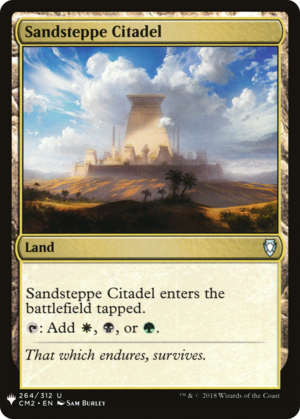
Card Details
Info
| Color: | |
| Identifies: | |
| Cost: | |
| Rarity: | Uncommon |
| Converted Cost: | 0 |
| Power/Toughness: | / |
| Types: | |
| SubTypes: | |
| Languages: | 
          |
| Layout: | Normal |
| Rank: | |
| Saltiness: |
Rules
Text
This land enters tapped.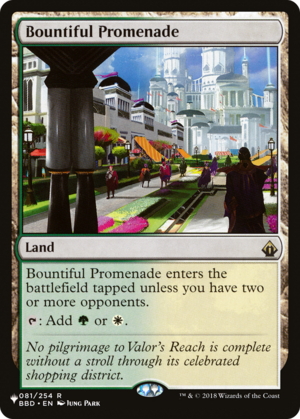
Card Details
Info
| Color: | |
| Identifies: | |
| Cost: | |
| Rarity: | Rare |
| Converted Cost: | 0 |
| Power/Toughness: | / |
| Types: | |
| SubTypes: | |
| Languages: | 
          |
| Layout: | Normal |
| Rank: | |
| Saltiness: |
Rules
Text
This land enters tapped unless you have two or more opponents.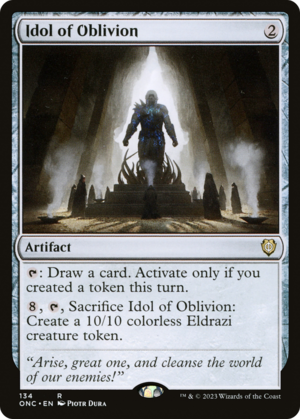
Card Details
Info
| Color: | |
| Identifies: | |
| Cost: |
|
| Rarity: | Rare |
| Converted Cost: | 2 |
| Power/Toughness: | / |
| Types: | |
| SubTypes: | |
| Languages: | 
         |
| Layout: | Normal |
| Rank: | |
| Saltiness: | |
| Tokens: |
Rules
Text
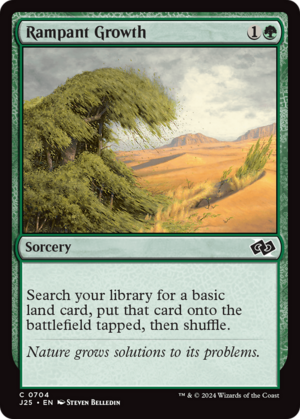
Card Details
Info
| Color: | |
| Identifies: | |
| Cost: |
|
| Rarity: | Common |
| Converted Cost: | 2 |
| Power/Toughness: | / |
| Types: | |
| SubTypes: | |
| Languages: | 
          |
| Layout: | Normal |
| Rank: | |
| Saltiness: |
Rules
Text
Search your library for a basic land card, put that card onto the battlefield tapped, thenshuffle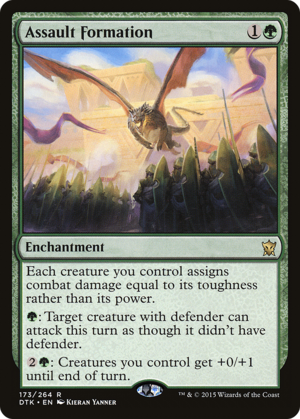
Card Details
Info
| Color: | |
| Identifies: | |
| Cost: |
|
| Rarity: | Rare |
| Converted Cost: | 2 |
| Power/Toughness: | / |
| Types: | |
| SubTypes: | |
| Languages: | 
          |
| Layout: | Normal |
| Rank: | |
| Saltiness: |
Rules
Prices
Legalities
Standard
Standardbrawl
Vintage
Modern
Brawl
Historic
Duel
Alchemy
Predh
Oathbreaker
Commander
Pioneer
Oldschool
Timeless
Premodern
Penny
Pauper
Gladiator
Paupercommander
Future
Legacy
Text
Each creature you control assigns combat damage equal to its toughness rather than its power.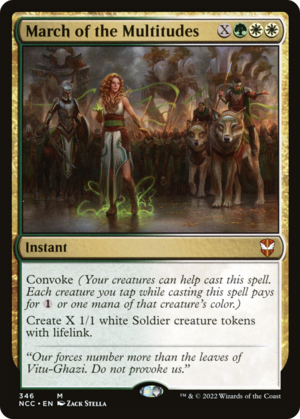
Card Details
Info
| Color: | |
| Identifies: | |
| Cost: |
|
| Rarity: | Mythic |
| Converted Cost: | 3 |
| Power/Toughness: | / |
| Types: | |
| SubTypes: | |
| Languages: | 
          |
| Layout: | Normal |
| Rank: | |
| Saltiness: | |
| Tokens: |
Abilities/Keywords
Rules
Text
Convoke (Your creatures can help cast this spell. Each creature you tap while casting this spell pays for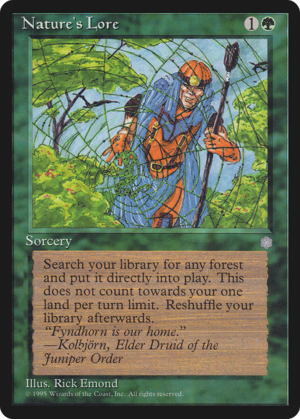
Card Details
Info
| Color: | |
| Identifies: | |
| Cost: |
|
| Rarity: | Uncommon |
| Converted Cost: | 2 |
| Power/Toughness: | / |
| Types: | |
| SubTypes: | |
| Languages: | 
          |
| Layout: | Normal |
| Rank: | |
| Saltiness: |
Rules
Text
Search your library for a Forest card, put that card onto the battlefield, thenshuffle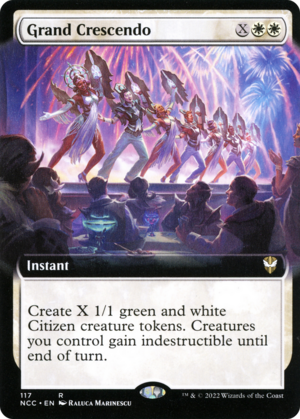
Card Details
Info
| Color: | |
| Identifies: | |
| Cost: |
|
| Rarity: | Rare |
| Converted Cost: | 2 |
| Power/Toughness: | / |
| Types: | |
| SubTypes: | |
| Languages: | 
         |
| Layout: | Normal |
| Rank: | |
| Saltiness: | |
| Tokens: |
Rules
Text
Create X 1/1 green and white Citizen creature tokens. Creatures you control gain indestructible until end of turn.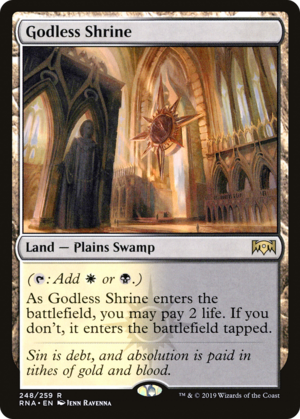
Card Details
Info
| Color: | |
| Identifies: | |
| Cost: | |
| Rarity: | Rare |
| Converted Cost: | 0 |
| Power/Toughness: | / |
| Types: | |
| SubTypes: | |
| Languages: | 
          |
| Layout: | Normal |
| Rank: | |
| Saltiness: |
Rules
Prices
Legalities
Standard
Standardbrawl
Vintage
Modern
Brawl
Historic
Duel
Alchemy
Predh
Oathbreaker
Commander
Pioneer
Oldschool
Timeless
Premodern
Penny
Pauper
Gladiator
Paupercommander
Future
Legacy
Text
(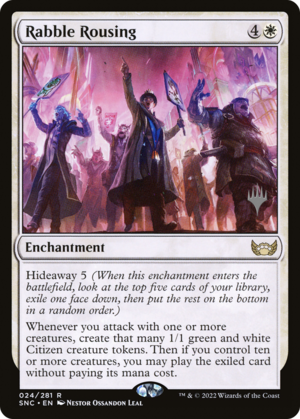
Card Details
Info
| Color: | |
| Identifies: | |
| Cost: |
|
| Rarity: | Rare |
| Converted Cost: | 5 |
| Power/Toughness: | / |
| Types: | |
| SubTypes: | |
| Languages: | 
          |
| Layout: | Normal |
| Rank: | |
| Saltiness: | |
| Tokens: |
Abilities/Keywords
Rules
Prices
Legalities
Standard
Standardbrawl
Vintage
Modern
Brawl
Historic
Duel
Alchemy
Predh
Oathbreaker
Commander
Pioneer
Oldschool
Timeless
Premodern
Penny
Pauper
Gladiator
Paupercommander
Future
Legacy
Text
Hideaway 5 (When this enchantment enters, look at the top five cards of your library, exile one face down, then put the rest on the bottom in a random order.) Whenever you attack with one or more creatures, create that many 1/1 green and white Citizen creature tokens. Then if you control ten or more creatures, you may play the exiled card without paying its mana cost.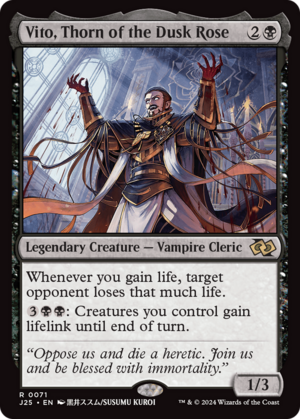
Card Details
Info
| Color: | |
| Identifies: | |
| Cost: |
|
| Rarity: | Rare |
| Converted Cost: | 3 |
| Power/Toughness: | 1/3 |
| Types: | |
| SubTypes: | |
| Languages: | 
      |
| Layout: | Normal |
| Rank: | |
| Saltiness: |
Rules
Text
Whenever you gain life, target opponent loses that much life.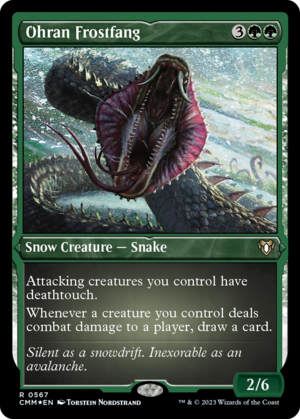
Card Details
Info
| Color: | |
| Identifies: | |
| Cost: |
|
| Rarity: | Rare |
| Converted Cost: | 5 |
| Power/Toughness: | 2/6 |
| Types: | |
| SubTypes: | |
| Languages: | 
        |
| Layout: | Normal |
| Rank: | |
| Saltiness: |
Rules
Prices
Legalities
Standard
Standardbrawl
Vintage
Modern
Brawl
Historic
Duel
Alchemy
Predh
Oathbreaker
Commander
Pioneer
Oldschool
Timeless
Premodern
Penny
Pauper
Gladiator
Paupercommander
Future
Legacy
Text
Attacking creatures you control have deathtouch. Whenever a creature you control deals combat damage to a player, draw a card.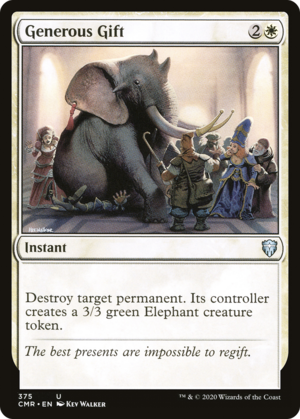
Card Details
Info
| Color: | |
| Identifies: | |
| Cost: |
|
| Rarity: | Uncommon |
| Converted Cost: | 3 |
| Power/Toughness: | / |
| Types: | |
| SubTypes: | |
| Languages: | 
          |
| Layout: | Normal |
| Rank: | |
| Saltiness: | |
| Tokens: |
Rules
Prices
Legalities
Standard
Standardbrawl
Vintage
Modern
Brawl
Historic
Duel
Alchemy
Predh
Oathbreaker
Commander
Pioneer
Oldschool
Timeless
Premodern
Penny
Pauper
Gladiator
Paupercommander
Future
Legacy
Text
Destroy target permanent. Its controller creates a 3/3 green Elephant creature token.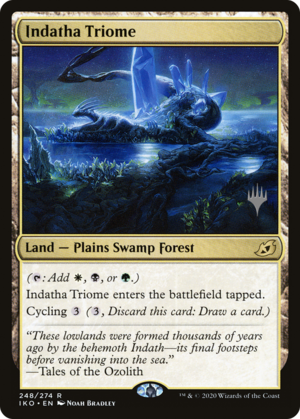
Card Details
Info
| Color: | |
| Identifies: | |
| Cost: | |
| Rarity: | Rare |
| Converted Cost: | 0 |
| Power/Toughness: | / |
| Types: | |
| SubTypes: | |
| Languages: | 
          |
| Layout: | Normal |
| Rank: | |
| Saltiness: |
Abilities/Keywords
Rules
Prices
Legalities
Standard
Standardbrawl
Vintage
Modern
Brawl
Historic
Duel
Alchemy
Predh
Oathbreaker
Commander
Pioneer
Oldschool
Timeless
Premodern
Penny
Pauper
Gladiator
Paupercommander
Future
Legacy
Text
(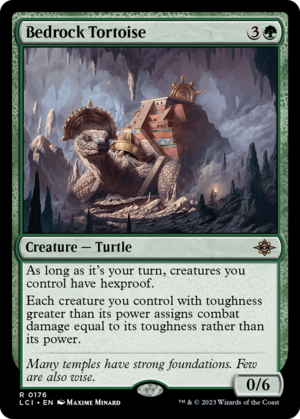
Card Details
Info
| Color: | |
| Identifies: | |
| Cost: |
|
| Rarity: | Rare |
| Converted Cost: | 4 |
| Power/Toughness: | 0/6 |
| Types: | |
| SubTypes: | |
| Languages: | 
       |
| Layout: | Normal |
| Rank: | |
| Saltiness: |
Rules
Prices
Legalities
Standard
Standardbrawl
Vintage
Modern
Brawl
Historic
Duel
Alchemy
Predh
Oathbreaker
Commander
Pioneer
Oldschool
Timeless
Premodern
Penny
Pauper
Gladiator
Paupercommander
Future
Legacy
Text
During your turn, creatures you control have hexproof. Each creature you control with toughness greater than its power assigns combat damage equal to its toughness rather than its power.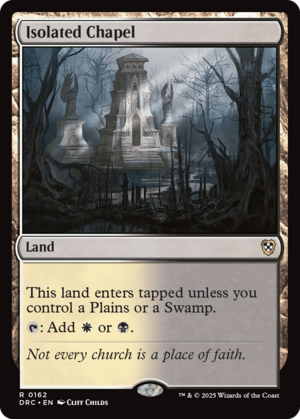
Card Details
Info
| Color: | |
| Identifies: | |
| Cost: | |
| Rarity: | Rare |
| Converted Cost: | 0 |
| Power/Toughness: | / |
| Types: | |
| SubTypes: | |
| Languages: | 
          |
| Layout: | Normal |
| Rank: | |
| Saltiness: |
Rules
Text
This land enters tapped unless you control a Plains or a Swamp.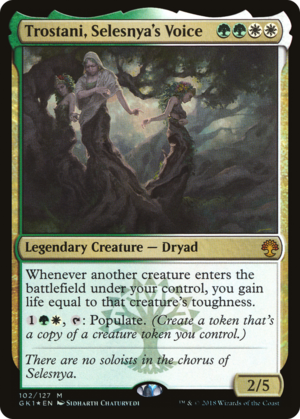
Card Details
Info
| Color: | |
| Identifies: | |
| Cost: |
|
| Rarity: | Mythic |
| Converted Cost: | 4 |
| Power/Toughness: | 2/5 |
| Types: | |
| SubTypes: | |
| Languages: | 
          |
| Layout: | Normal |
| Rank: | |
| Saltiness: |
Abilities/Keywords
Rules
Text
Whenever another creature you control enters, you gain life equal to that creature's toughness.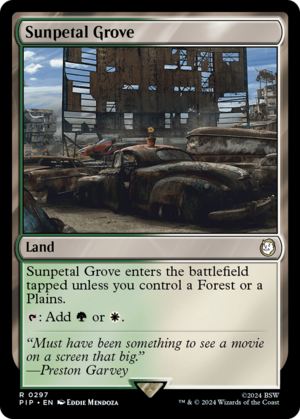
Card Details
Info
| Color: | |
| Identifies: | |
| Cost: | |
| Rarity: | Rare |
| Converted Cost: | 0 |
| Power/Toughness: | / |
| Types: | |
| SubTypes: | |
| Languages: | 
          |
| Layout: | Normal |
| Rank: | |
| Saltiness: |
Rules
Prices
Legalities
Standard
Standardbrawl
Vintage
Modern
Brawl
Historic
Duel
Alchemy
Predh
Oathbreaker
Commander
Pioneer
Oldschool
Timeless
Premodern
Penny
Pauper
Gladiator
Paupercommander
Future
Legacy
Text
This land enters tapped unless you control a Forest or a Plains.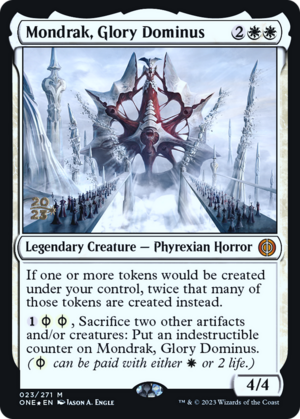
Card Details
Info
| Color: | |
| Identifies: | |
| Cost: |
|
| Rarity: | Mythic |
| Converted Cost: | 4 |
| Power/Toughness: | 4/4 |
| Types: | |
| SubTypes: | |
| Languages: | 
|
| Layout: | Normal |
| Rank: | |
| Saltiness: |
Rules
Text
If one or more tokens would be created under your control, twice that many of those tokens are created instead.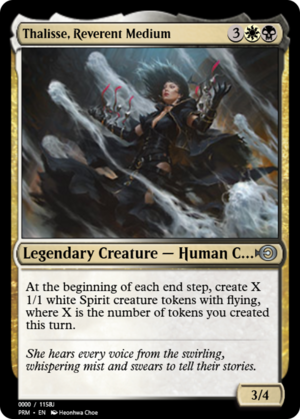
Card Details
Info
| Color: | |
| Identifies: | |
| Cost: |
|
| Rarity: | Uncommon |
| Converted Cost: | 5 |
| Power/Toughness: | 3/4 |
| Types: | |
| SubTypes: | |
| Languages: | 
        |
| Layout: | Normal |
| Rank: | |
| Saltiness: | |
| Tokens: |
Rules
Prices
| Seller | Price |
|---|
Legalities
Standard
Standardbrawl
Vintage
Modern
Brawl
Historic
Duel
Alchemy
Predh
Oathbreaker
Commander
Pioneer
Oldschool
Timeless
Premodern
Penny
Pauper
Gladiator
Paupercommander
Future
Legacy
Text
At the beginning of each end step, create X 1/1 white Spirit creature tokens with flying, where X is the number of tokens you created this turn.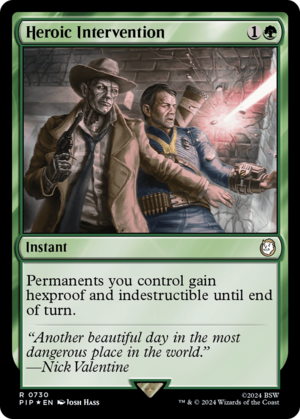
Card Details
Info
| Color: | |
| Identifies: | |
| Cost: |
|
| Rarity: | Rare |
| Converted Cost: | 2 |
| Power/Toughness: | / |
| Types: | |
| SubTypes: | |
| Languages: | 
          |
| Layout: | Normal |
| Rank: | |
| Saltiness: |
Rules
Text
Permanents you control gain hexproof and indestructible until end of turn.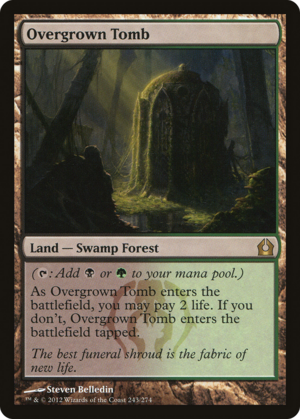
Card Details
Info
| Color: | |
| Identifies: | |
| Cost: | |
| Rarity: | Rare |
| Converted Cost: | 0 |
| Power/Toughness: | / |
| Types: | |
| SubTypes: | |
| Languages: | 
          |
| Layout: | Normal |
| Rank: | |
| Saltiness: |
Rules
Prices
Legalities
Standard
Standardbrawl
Vintage
Modern
Brawl
Historic
Duel
Alchemy
Predh
Oathbreaker
Commander
Pioneer
Oldschool
Timeless
Premodern
Penny
Pauper
Gladiator
Paupercommander
Future
Legacy
Text
(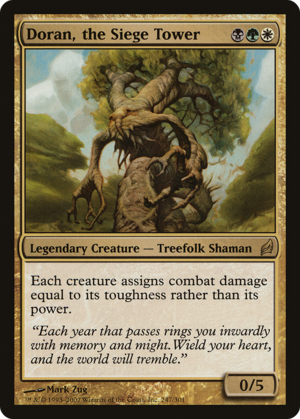
Card Details
Info
| Color: | |
| Identifies: | |
| Cost: |
|
| Rarity: | Rare |
| Converted Cost: | 3 |
| Power/Toughness: | 0/5 |
| Types: | |
| SubTypes: | |
| Languages: | 
        |
| Layout: | Normal |
| Rank: | |
| Saltiness: |
Rules
Prices
Legalities
Standard
Standardbrawl
Vintage
Modern
Brawl
Historic
Duel
Alchemy
Predh
Oathbreaker
Commander
Pioneer
Oldschool
Timeless
Premodern
Penny
Pauper
Gladiator
Paupercommander
Future
Legacy
Text
Each creature assigns combat damage equal to its toughness rather than its power.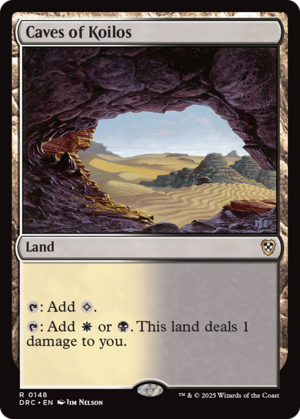
Card Details
Info
| Color: | |
| Identifies: | |
| Cost: | |
| Rarity: | Rare |
| Converted Cost: | 0 |
| Power/Toughness: | / |
| Types: | |
| SubTypes: | |
| Languages: | 
          |
| Layout: | Normal |
| Rank: | |
| Saltiness: |
Rules
Prices
Legalities
Standard
Standardbrawl
Vintage
Modern
Brawl
Historic
Duel
Alchemy
Predh
Oathbreaker
Commander
Pioneer
Oldschool
Timeless
Premodern
Penny
Pauper
Gladiator
Paupercommander
Future
Legacy
Text
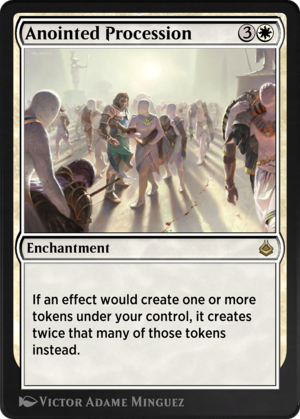
Card Details
Info
| Color: | |
| Identifies: | |
| Cost: |
|
| Rarity: | Rare |
| Converted Cost: | 4 |
| Power/Toughness: | / |
| Types: | |
| SubTypes: | |
| Languages: | 
          |
| Layout: | Normal |
| Rank: | |
| Saltiness: |
Rules
Prices
| Seller | Price |
|---|
Legalities
Standard
Standardbrawl
Vintage
Modern
Brawl
Historic
Duel
Alchemy
Predh
Oathbreaker
Commander
Pioneer
Oldschool
Timeless
Premodern
Penny
Pauper
Gladiator
Paupercommander
Future
Legacy
Text
If an effect would create one or more tokens under your control, it creates twice that many of those tokens instead.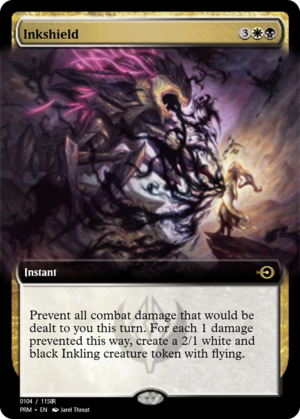
Card Details
Info
| Color: | |
| Identifies: | |
| Cost: |
|
| Rarity: | Rare |
| Converted Cost: | 5 |
| Power/Toughness: | / |
| Types: | |
| SubTypes: | |
| Languages: | 
     |
| Layout: | Normal |
| Rank: | |
| Saltiness: | |
| Tokens: |
Rules
Prices
| Seller | Price |
|---|
Legalities
Standard
Standardbrawl
Vintage
Modern
Brawl
Historic
Duel
Alchemy
Predh
Oathbreaker
Commander
Pioneer
Oldschool
Timeless
Premodern
Penny
Pauper
Gladiator
Paupercommander
Future
Legacy
Text
Prevent all combat damage that would be dealt to you this turn. For each 1 damage prevented this way, create a 2/1 white and black Inkling creature token with flying.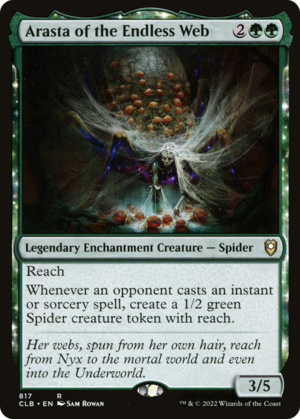
Card Details
Info
| Color: | |
| Identifies: | |
| Cost: |
|
| Rarity: | Rare |
| Converted Cost: | 4 |
| Power/Toughness: | 3/5 |
| Types: | |
| SubTypes: | |
| Languages: | 
          |
| Layout: | Normal |
| Rank: | |
| Saltiness: | |
| Tokens: |
Abilities/Keywords
Rules
Text
Reach Whenever an opponent casts an instant or sorcery spell, create a 1/2 green Spider creature token with reach.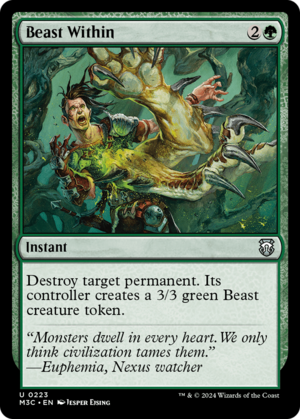
Card Details
Info
| Color: | |
| Identifies: | |
| Cost: |
|
| Rarity: | Uncommon |
| Converted Cost: | 3 |
| Power/Toughness: | / |
| Types: | |
| SubTypes: | |
| Languages: | 
         |
| Layout: | Normal |
| Rank: | |
| Saltiness: | |
| Tokens: |
Rules
Prices
Legalities
Standard
Standardbrawl
Vintage
Modern
Brawl
Historic
Duel
Alchemy
Predh
Oathbreaker
Commander
Pioneer
Oldschool
Timeless
Premodern
Penny
Pauper
Gladiator
Paupercommander
Future
Legacy
Text
Destroy target permanent. Its controller creates a 3/3 green Beast creature token.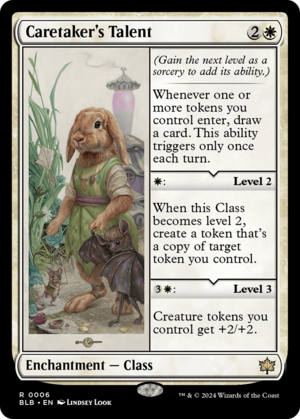
Card Details
Info
| Color: | |
| Identifies: | |
| Cost: |
|
| Rarity: | Rare |
| Converted Cost: | 3 |
| Power/Toughness: | / |
| Types: | |
| SubTypes: | |
| Languages: | 
     |
| Layout: | Class |
| Rank: | |
| Saltiness: |
Rules
Prices
Legalities
Standard
Standardbrawl
Vintage
Modern
Brawl
Historic
Duel
Alchemy
Predh
Oathbreaker
Commander
Pioneer
Oldschool
Timeless
Premodern
Penny
Pauper
Gladiator
Paupercommander
Future
Legacy
Text
(Gain the next level as a sorcery to add its ability.) Whenever one or more tokens you control enter, draw a card. This ability triggers only once each turn.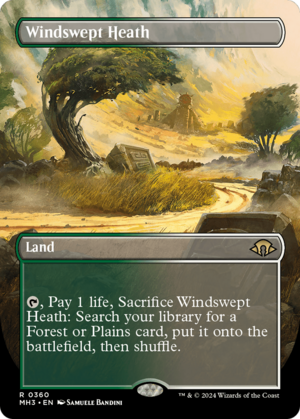
Card Details
Info
| Color: | |
| Identifies: | |
| Cost: | |
| Rarity: | Rare |
| Converted Cost: | 0 |
| Power/Toughness: | / |
| Types: | |
| SubTypes: | |
| Languages: | 
          |
| Layout: | Normal |
| Rank: | |
| Saltiness: |
Rules
Prices
Legalities
Standard
Standardbrawl
Vintage
Modern
Brawl
Historic
Duel
Alchemy
Predh
Oathbreaker
Commander
Pioneer
Oldschool
Timeless
Premodern
Penny
Pauper
Gladiator
Paupercommander
Future
Legacy
Text
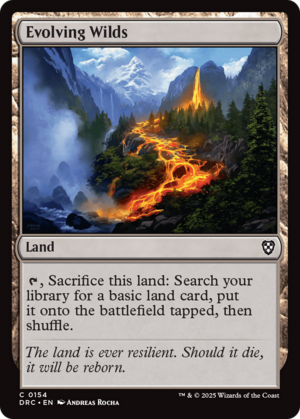
Card Details
Info
| Color: | |
| Identifies: | |
| Cost: | |
| Rarity: | Common |
| Converted Cost: | 0 |
| Power/Toughness: | / |
| Types: | |
| SubTypes: | |
| Languages: | 
          |
| Layout: | Normal |
| Rank: | |
| Saltiness: |
Rules
Text
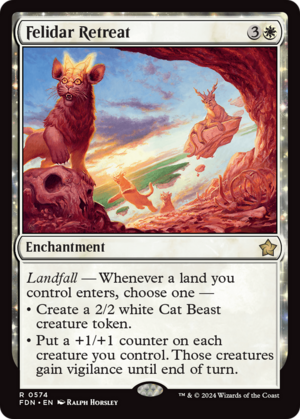
Card Details
Info
| Color: | |
| Identifies: | |
| Cost: |
|
| Rarity: | Rare |
| Converted Cost: | 4 |
| Power/Toughness: | / |
| Types: | |
| SubTypes: | |
| Languages: | 
          |
| Layout: | Normal |
| Rank: | |
| Saltiness: | |
| Tokens: |
Abilities/Keywords
Rules
Text
Landfall — Whenever a land you control enters, choose one — • Create a 2/2 white Cat Beast creature token. • Put a +1/+1counteron each creature you control. Those creatures gain vigilance until end of turn.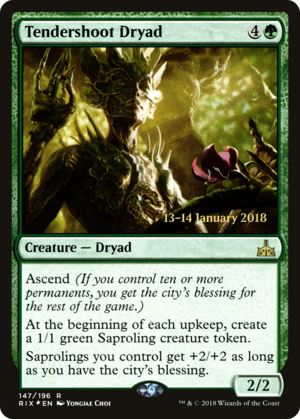
Card Details
Info
| Color: | |
| Identifies: | |
| Cost: |
|
| Rarity: | Rare |
| Converted Cost: | 5 |
| Power/Toughness: | 2/2 |
| Types: | |
| SubTypes: | |
| Languages: | 
          |
| Layout: | Normal |
| Rank: | |
| Saltiness: | |
| Tokens: |
Abilities/Keywords
Rules
Text
Ascend (If you control ten or more permanents, you get the city's blessing for the rest of the game.) At the beginning of each upkeep, create a 1/1 green Saproling creature token. Saprolings you control get +2/+2 as long as you have the city's blessing.
Card Details
Info
Abilities/Keywords
Rules
Text
Landfall — Whenever a land you control enters, create a 1/1 green Insect creature token. If you control six or more lands, create a token that's a copy of this creature instead.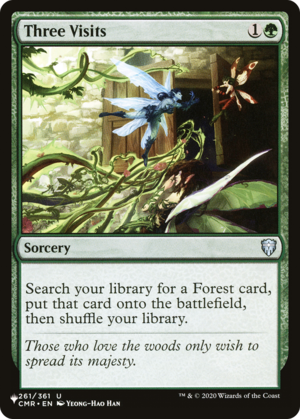
Card Details
Info
| Color: | |
| Identifies: | |
| Cost: |
|
| Rarity: | Uncommon |
| Converted Cost: | 2 |
| Power/Toughness: | / |
| Types: | |
| SubTypes: | |
| Languages: | 
         |
| Layout: | Normal |
| Rank: | |
| Saltiness: |
Rules
Text
Search your library for a Forest card, put it onto the battlefield, thenshuffle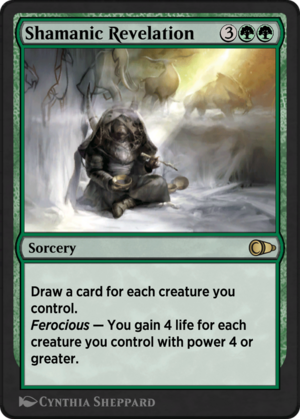
Card Details
Info
| Color: | |
| Identifies: | |
| Cost: |
|
| Rarity: | Rare |
| Converted Cost: | 5 |
| Power/Toughness: | / |
| Types: | |
| SubTypes: | |
| Languages: | 
          |
| Layout: | Normal |
| Rank: | |
| Saltiness: |
Abilities/Keywords
Rules
Prices
| Seller | Price |
|---|
Legalities
Standard
Standardbrawl
Vintage
Modern
Brawl
Historic
Duel
Alchemy
Predh
Oathbreaker
Commander
Pioneer
Oldschool
Timeless
Premodern
Penny
Pauper
Gladiator
Paupercommander
Future
Legacy
Text
Draw a card for each creature you control. Ferocious — You gain 4 life for each creature you control with power 4 or greater.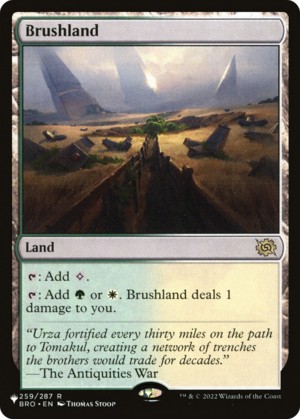
Card Details
Info
| Color: | |
| Identifies: | |
| Cost: | |
| Rarity: | Rare |
| Converted Cost: | 0 |
| Power/Toughness: | / |
| Types: | |
| SubTypes: | |
| Languages: | 
        |
| Layout: | Normal |
| Rank: | |
| Saltiness: |
Rules
Text
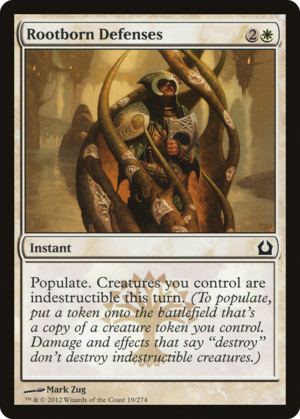
Card Details
Info
| Color: | |
| Identifies: | |
| Cost: |
|
| Rarity: | Common |
| Converted Cost: | 3 |
| Power/Toughness: | / |
| Types: | |
| SubTypes: | |
| Languages: | 
          |
| Layout: | Normal |
| Rank: | |
| Saltiness: |
Abilities/Keywords
Rules
Prices
Legalities
Standard
Standardbrawl
Vintage
Modern
Brawl
Historic
Duel
Alchemy
Predh
Oathbreaker
Commander
Pioneer
Oldschool
Timeless
Premodern
Penny
Pauper
Gladiator
Paupercommander
Future
Legacy
Text
Populate. Creatures you control gain indestructible until end of turn. (To populate, create a token that's a copy of a creature token you control.)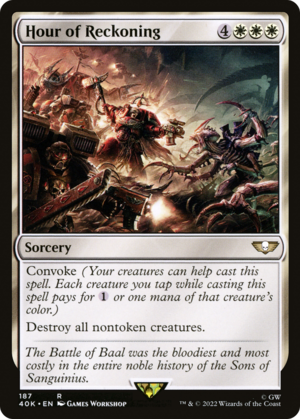
Card Details
Info
| Color: | |
| Identifies: | |
| Cost: |
|
| Rarity: | Rare |
| Converted Cost: | 7 |
| Power/Toughness: | / |
| Types: | |
| SubTypes: | |
| Languages: | 
         |
| Layout: | Normal |
| Rank: | |
| Saltiness: |
Abilities/Keywords
Rules
Prices
Legalities
Standard
Standardbrawl
Vintage
Modern
Brawl
Historic
Duel
Alchemy
Predh
Oathbreaker
Commander
Pioneer
Oldschool
Timeless
Premodern
Penny
Pauper
Gladiator
Paupercommander
Future
Legacy
Text
Convoke (Your creatures can help cast this spell. Each creature you tap while casting this spell pays for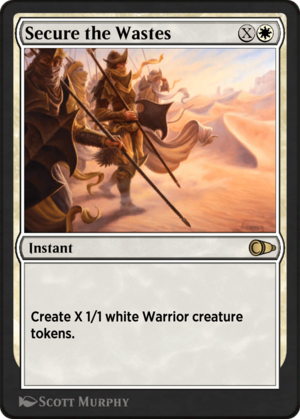
Card Details
Info
| Color: | |
| Identifies: | |
| Cost: |
|
| Rarity: | Rare |
| Converted Cost: | 1 |
| Power/Toughness: | / |
| Types: | |
| SubTypes: | |
| Languages: | 
          |
| Layout: | Normal |
| Rank: | |
| Saltiness: | |
| Tokens: |
Rules
Prices
| Seller | Price |
|---|
Legalities
Standard
Standardbrawl
Vintage
Modern
Brawl
Historic
Duel
Alchemy
Predh
Oathbreaker
Commander
Pioneer
Oldschool
Timeless
Premodern
Penny
Pauper
Gladiator
Paupercommander
Future
Legacy
Text
Create X 1/1 white Warrior creature tokens.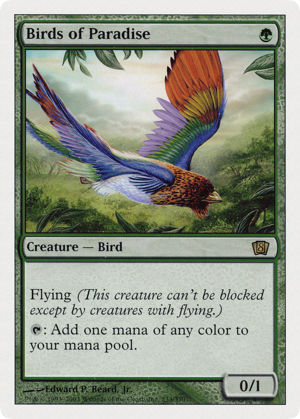
Card Details
Info
| Color: | |
| Identifies: | |
| Cost: |
|
| Rarity: | Rare |
| Converted Cost: | 1 |
| Power/Toughness: | 0/1 |
| Types: | |
| SubTypes: | |
| Languages: | 
          |
| Layout: | Normal |
| Rank: | |
| Saltiness: |
Abilities/Keywords
Rules
Prices
| Seller | Price |
|---|---|
| Cardkingdom | / 449.99 USD 16.99 USD |
| Tcgplayer | 11.68 USD / 219.99 USD |
| Cardmarket | 5.11 EUR / 120.47 EUR |
Legalities
Standard
Standardbrawl
Vintage
Modern
Brawl
Historic
Duel
Alchemy
Predh
Oathbreaker
Commander
Pioneer
Oldschool
Timeless
Premodern
Penny
Pauper
Gladiator
Paupercommander
Future
Legacy
Text
Flying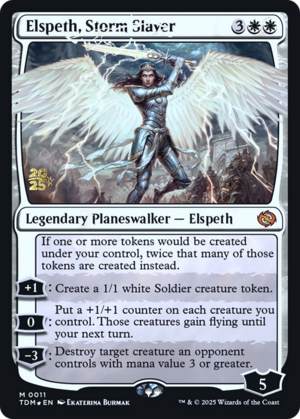
Card Details
Info
| Color: | |
| Identifies: | |
| Cost: |
|
| Rarity: | Mythic |
| Converted Cost: | 5 |
| Power/Toughness: | / |
| Types: | |
| SubTypes: | |
| Languages: | 
 |
| Layout: | Normal |
| Rank: | |
| Saltiness: | |
| Tokens: |
Rules
Text
If one or more tokens would be created under your control, twice that many of those tokens are created instead.+1 Create a 1/1 white Soldier creature token.
0 Put a +1/+1counteron each creature you control. Those creatures gain flying until your next turn.
−3Destroytarget creature an opponent controls with mana value 3 or greater.
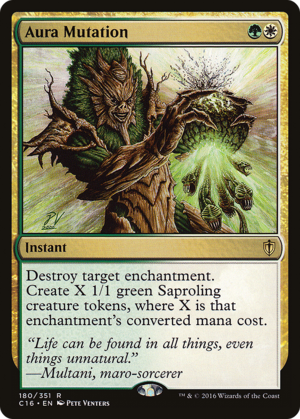
Card Details
Info
| Color: | |
| Identifies: | |
| Cost: |
|
| Rarity: | Rare |
| Converted Cost: | 2 |
| Power/Toughness: | / |
| Types: | |
| SubTypes: | |
| Languages: | 
         |
| Layout: | Normal |
| Rank: | |
| Saltiness: | |
| Tokens: |
Rules
Prices
Legalities
Standard
Standardbrawl
Vintage
Modern
Brawl
Historic
Duel
Alchemy
Predh
Oathbreaker
Commander
Pioneer
Oldschool
Timeless
Premodern
Penny
Pauper
Gladiator
Paupercommander
Future
Legacy
Text
Destroy target enchantment. Create X 1/1 green Saproling creature tokens, where X is that enchantment's mana value.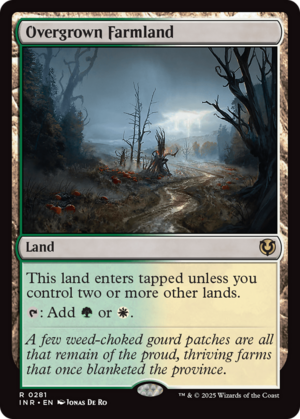
Card Details
Info
| Color: | |
| Identifies: | |
| Cost: | |
| Rarity: | Rare |
| Converted Cost: | 0 |
| Power/Toughness: | / |
| Types: | |
| SubTypes: | |
| Languages: | 
          |
| Layout: | Normal |
| Rank: | |
| Saltiness: |
Rules
Prices
Legalities
Standard
Standardbrawl
Vintage
Modern
Brawl
Historic
Duel
Alchemy
Predh
Oathbreaker
Commander
Pioneer
Oldschool
Timeless
Premodern
Penny
Pauper
Gladiator
Paupercommander
Future
Legacy
Text
This land enters tapped unless you control two or more other lands.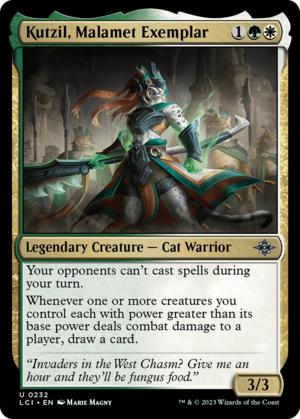
Card Details
Info
| Color: | |
| Identifies: | |
| Cost: |
|
| Rarity: | Uncommon |
| Converted Cost: | 3 |
| Power/Toughness: | 3/3 |
| Types: | |
| SubTypes: | |
| Languages: | 
       |
| Layout: | Normal |
| Rank: | |
| Saltiness: |
Rules
Prices
Legalities
Standard
Standardbrawl
Vintage
Modern
Brawl
Historic
Duel
Alchemy
Predh
Oathbreaker
Commander
Pioneer
Oldschool
Timeless
Premodern
Penny
Pauper
Gladiator
Paupercommander
Future
Legacy
Text
Your opponents can't cast spells during your turn. Whenever one or more creatures you control each with power greater than its base power deals combat damage to a player, draw a card.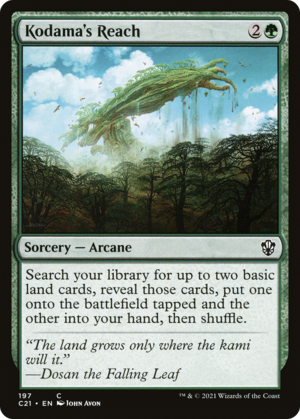
Card Details
Info
| Color: | |
| Identifies: | |
| Cost: |
|
| Rarity: | Common |
| Converted Cost: | 3 |
| Power/Toughness: | / |
| Types: | |
| SubTypes: | |
| Languages: | 
         |
| Layout: | Normal |
| Rank: | |
| Saltiness: |
Rules
Prices
Legalities
Standard
Standardbrawl
Vintage
Modern
Brawl
Historic
Duel
Alchemy
Predh
Oathbreaker
Commander
Pioneer
Oldschool
Timeless
Premodern
Penny
Pauper
Gladiator
Paupercommander
Future
Legacy
Text
Search your library for up to two basic land cards, reveal those cards, put one onto the battlefield tapped and the other into your hand, thenshuffle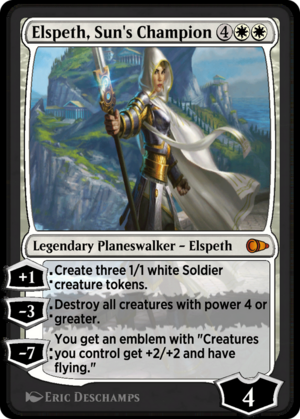
Card Details
Info
| Color: | |
| Identifies: | |
| Cost: |
|
| Rarity: | Mythic |
| Converted Cost: | 6 |
| Power/Toughness: | / |
| Types: | |
| SubTypes: | |
| Languages: | 
          |
| Layout: | Normal |
| Rank: | |
| Saltiness: | |
| Tokens: |
Rules
Prices
| Seller | Price |
|---|
Legalities
Standard
Standardbrawl
Vintage
Modern
Brawl
Historic
Duel
Alchemy
Predh
Oathbreaker
Commander
Pioneer
Oldschool
Timeless
Premodern
Penny
Pauper
Gladiator
Paupercommander
Future
Legacy
Text
+1 Create three 1/1 white Soldier creature tokens.
−3Destroyall creatures with power 4 or greater.
−7 You get an emblem with "Creatures you control get +2/+2 and have flying."
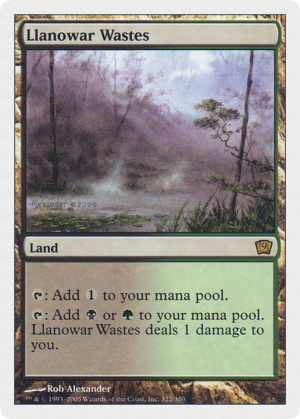
Card Details
Info
| Color: | |
| Identifies: | |
| Cost: | |
| Rarity: | Rare |
| Converted Cost: | 0 |
| Power/Toughness: | / |
| Types: | |
| SubTypes: | |
| Languages: | 
          |
| Layout: | Normal |
| Rank: | |
| Saltiness: |
Rules
Prices
Legalities
Standard
Standardbrawl
Vintage
Modern
Brawl
Historic
Duel
Alchemy
Predh
Oathbreaker
Commander
Pioneer
Oldschool
Timeless
Premodern
Penny
Pauper
Gladiator
Paupercommander
Future
Legacy
Text
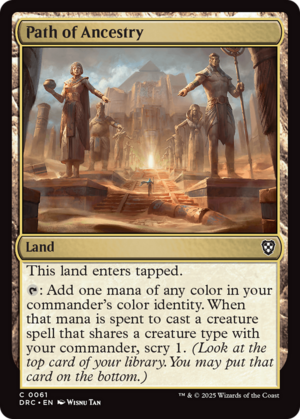
Card Details
Info
| Color: | |
| Identifies: | |
| Cost: | |
| Rarity: | Common |
| Converted Cost: | 0 |
| Power/Toughness: | / |
| Types: | |
| SubTypes: | |
| Languages: | 
         |
| Layout: | Normal |
| Rank: | |
| Saltiness: |
Abilities/Keywords
Rules
Text
This land enters tapped.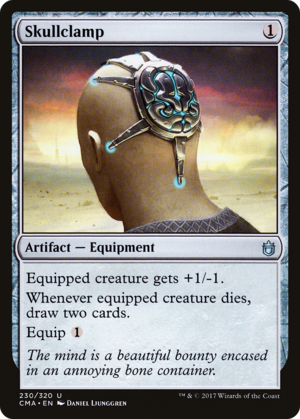
Card Details
Info
| Color: | |
| Identifies: | |
| Cost: |
|
| Rarity: | Uncommon |
| Converted Cost: | 1 |
| Power/Toughness: | / |
| Types: | |
| SubTypes: | |
| Languages: | 
         |
| Layout: | Normal |
| Rank: | |
| Saltiness: |
Abilities/Keywords
Rules
Prices
Legalities
Standard
Standardbrawl
Vintage
Modern
Brawl
Historic
Duel
Alchemy
Predh
Oathbreaker
Commander
Pioneer
Oldschool
Timeless
Premodern
Penny
Pauper
Gladiator
Paupercommander
Future
Legacy
Text
Equipped creature gets +1/-1. Whenever equipped creature dies, draw two cards. Equip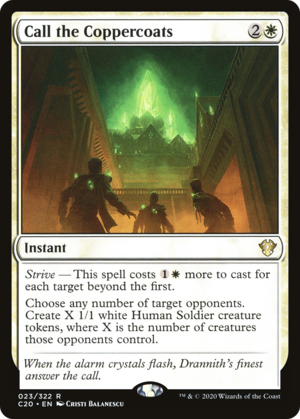
Card Details
Info
| Color: | |
| Identifies: | |
| Cost: |
|
| Rarity: | Rare |
| Converted Cost: | 3 |
| Power/Toughness: | / |
| Types: | |
| SubTypes: | |
| Languages: | 
         |
| Layout: | Normal |
| Rank: | |
| Saltiness: | |
| Tokens: |
Abilities/Keywords
Rules
Prices
Legalities
Standard
Standardbrawl
Vintage
Modern
Brawl
Historic
Duel
Alchemy
Predh
Oathbreaker
Commander
Pioneer
Oldschool
Timeless
Premodern
Penny
Pauper
Gladiator
Paupercommander
Future
Legacy
Text
Strive — This spell costs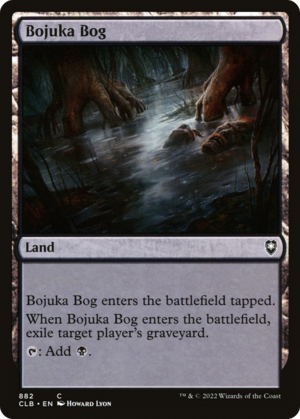
Card Details
Info
| Color: | |
| Identifies: | |
| Cost: | |
| Rarity: | Common |
| Converted Cost: | 0 |
| Power/Toughness: | / |
| Types: | |
| SubTypes: | |
| Languages: | 
         |
| Layout: | Normal |
| Rank: | |
| Saltiness: |
Rules
Prices
Legalities
Standard
Standardbrawl
Vintage
Modern
Brawl
Historic
Duel
Alchemy
Predh
Oathbreaker
Commander
Pioneer
Oldschool
Timeless
Premodern
Penny
Pauper
Gladiator
Paupercommander
Future
Legacy
Text
This land enters tapped. When this land enters, exile target player's graveyard.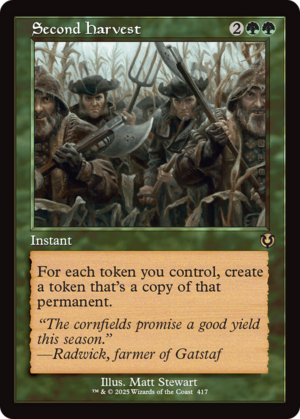
Card Details
Info
| Color: | |
| Identifies: | |
| Cost: |
|
| Rarity: | Rare |
| Converted Cost: | 4 |
| Power/Toughness: | / |
| Types: | |
| SubTypes: | |
| Languages: | 
          |
| Layout: | Normal |
| Rank: | |
| Saltiness: | |
| Tokens: |
Rules
Prices
Legalities
Standard
Standardbrawl
Vintage
Modern
Brawl
Historic
Duel
Alchemy
Predh
Oathbreaker
Commander
Pioneer
Oldschool
Timeless
Premodern
Penny
Pauper
Gladiator
Paupercommander
Future
Legacy
Text
For each token you control, create a token that's a copy of that permanent.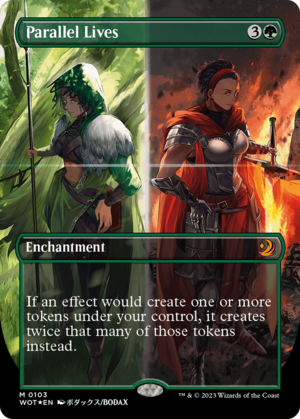
Card Details
Info
| Color: | |
| Identifies: | |
| Cost: |
|
| Rarity: | Mythic |
| Converted Cost: | 4 |
| Power/Toughness: | / |
| Types: | |
| SubTypes: | |
| Languages: | 
          |
| Layout: | Normal |
| Rank: | |
| Saltiness: |
Rules
Prices
| Seller | Price |
|---|---|
| Cardmarket | 107.01 EUR |
| Cardkingdom | 129.99 USD |
| Manapool | 112.7 USD |
| Tcgplayer | 113.37 USD |
Legalities
Standard
Standardbrawl
Vintage
Modern
Brawl
Historic
Duel
Alchemy
Predh
Oathbreaker
Commander
Pioneer
Oldschool
Timeless
Premodern
Penny
Pauper
Gladiator
Paupercommander
Future
Legacy
Text
If an effect would create one or more tokens under your control, it creates twice that many of those tokens instead.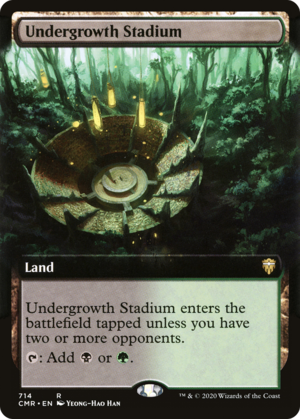
Card Details
Info
| Color: | |
| Identifies: | |
| Cost: | |
| Rarity: | Rare |
| Converted Cost: | 0 |
| Power/Toughness: | / |
| Types: | |
| SubTypes: | |
| Languages: | 
        |
| Layout: | Normal |
| Rank: | |
| Saltiness: |
Rules
Prices
Legalities
Standard
Standardbrawl
Vintage
Modern
Brawl
Historic
Duel
Alchemy
Predh
Oathbreaker
Commander
Pioneer
Oldschool
Timeless
Premodern
Penny
Pauper
Gladiator
Paupercommander
Future
Legacy
Text
This land enters tapped unless you have two or more opponents.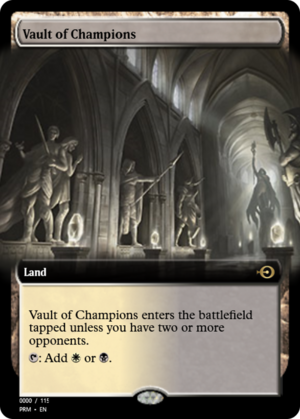
Card Details
Info
| Color: | |
| Identifies: | |
| Cost: | |
| Rarity: | Rare |
| Converted Cost: | 0 |
| Power/Toughness: | / |
| Types: | |
| SubTypes: | |
| Languages: | 
        |
| Layout: | Normal |
| Rank: | |
| Saltiness: |
Rules
Prices
| Seller | Price |
|---|
Legalities
Standard
Standardbrawl
Vintage
Modern
Brawl
Historic
Duel
Alchemy
Predh
Oathbreaker
Commander
Pioneer
Oldschool
Timeless
Premodern
Penny
Pauper
Gladiator
Paupercommander
Future
Legacy
Text
This land enters tapped unless you have two or more opponents.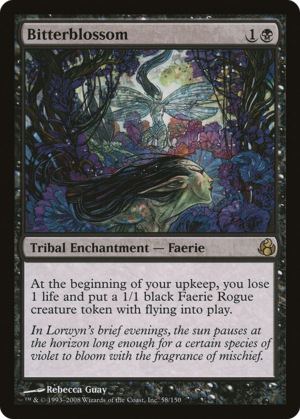
Card Details
Info
| Color: | |
| Identifies: | |
| Cost: |
|
| Rarity: | Rare |
| Converted Cost: | 2 |
| Power/Toughness: | / |
| Types: | |
| SubTypes: | |
| Languages: | 
        |
| Layout: | Normal |
| Rank: | |
| Saltiness: | |
| Tokens: |
Rules
Prices
| Seller | Price |
|---|---|
| Cardmarket | 18.93 EUR / 59.29 EUR |
| Cardkingdom | / 109.99 USD 49.99 USD |
| Tcgplayer | / 123.52 USD 31.29 USD |
| Manapool | / 78.68 USD 36.15 USD |
Legalities
Standard
Standardbrawl
Vintage
Modern
Brawl
Historic
Duel
Alchemy
Predh
Oathbreaker
Commander
Pioneer
Oldschool
Timeless
Premodern
Penny
Pauper
Gladiator
Paupercommander
Future
Legacy
Text
At the beginning of your upkeep, you lose 1 life and create a 1/1 black Faerie Rogue creature token with flying.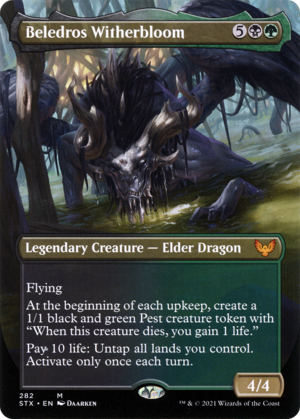
Card Details
Info
| Color: | |
| Identifies: | |
| Cost: |
|
| Rarity: | Mythic |
| Converted Cost: | 7 |
| Power/Toughness: | 4/4 |
| Types: | |
| SubTypes: | |
| Languages: | 
          |
| Layout: | Normal |
| Rank: | |
| Saltiness: | |
| Tokens: |
Abilities/Keywords
Rules
Prices
Legalities
Standard
Standardbrawl
Vintage
Modern
Brawl
Historic
Duel
Alchemy
Predh
Oathbreaker
Commander
Pioneer
Oldschool
Timeless
Premodern
Penny
Pauper
Gladiator
Paupercommander
Future
Legacy
Text
Flying At the beginning of each upkeep, create a 1/1 black and green Pest creature token with "When this token dies, you gain 1 life." Pay 10 life: Untap all lands you control. Activate only once each turn.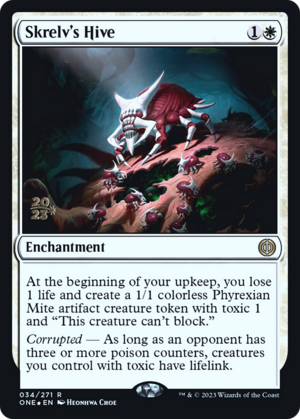
Card Details
Info
| Color: | |
| Identifies: | |
| Cost: |
|
| Rarity: | Rare |
| Converted Cost: | 2 |
| Power/Toughness: | / |
| Types: | |
| SubTypes: | |
| Languages: | 
       |
| Layout: | Normal |
| Rank: | |
| Saltiness: | |
| Tokens: |
Abilities/Keywords
Rules
Text
At the beginning of your upkeep, you lose 1 life and create a 1/1 colorless Phyrexian Mite artifact creature token with toxic 1 and "This token can't block." Corrupted — As long as an opponent has three or more poison counters, creatures you control with toxic have lifelink.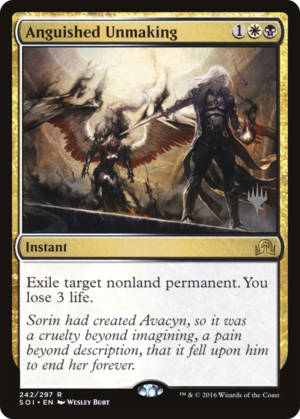
Card Details
Info
| Color: | |
| Identifies: | |
| Cost: |
|
| Rarity: | Rare |
| Converted Cost: | 3 |
| Power/Toughness: | / |
| Types: | |
| SubTypes: | |
| Languages: | 
          |
| Layout: | Normal |
| Rank: | |
| Saltiness: |
Rules
Prices
Legalities
Standard
Standardbrawl
Vintage
Modern
Brawl
Historic
Duel
Alchemy
Predh
Oathbreaker
Commander
Pioneer
Oldschool
Timeless
Premodern
Penny
Pauper
Gladiator
Paupercommander
Future
Legacy